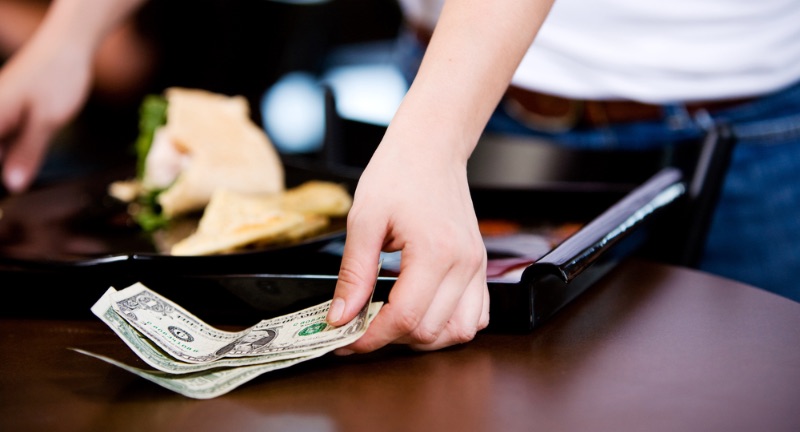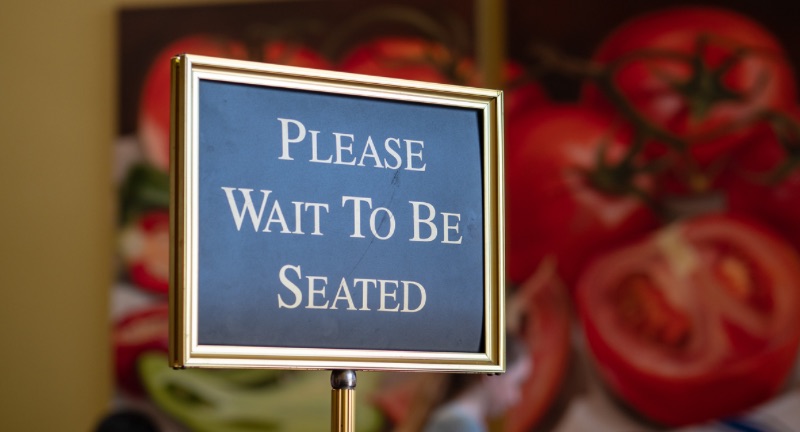
Shutterstock
In the bustling atmosphere of a busy restaurant, servers expertly juggle the art of hospitality with the need for efficient service. However, certain questions from diners are so frequently asked that they become tiresome for the staff and can disrupt the smooth flow of service. These inquiries, which range from merely curious to outright impractical, often reveal a lack of understanding about restaurant etiquette and operations.
By gaining insight into this dynamic, diners can better appreciate the complexities of restaurant service and enhance their overall dining experience. Let’s explore the nuances of server-diner interactions and uncover why some questions are best avoided. Here are the common questions that restaurant servers wish diners would stop asking.
Can you tell the kitchen to make it fast? We’re in a hurry.

IStock
Diners often ask for expedited service when they are pressed for time. However, pushing the kitchen to hurry can lead to a decline in food quality and disrupt the timely preparation of other guests’ orders. If you are in a rush, it’s wise to choose menu items that are faster to prepare or place a to-go order in advance. Recognizing that kitchens must manage multiple orders helps ensure that food quality is maintained without sacrificing speed.
Can I try a little sample first?

Shutterstock
Providing samples of every entrée could put a strain on kitchen resources and disrupt the careful management of portion sizes for each dish. Restaurants aim to deliver expertly prepared and perfectly portioned meals to their paying customers. To help guests choose their meals, servers can provide detailed descriptions of the dishes. Diners will benefit from approaching the menu with an open mind and trusting the recommendations offered by the staff.
Can you have them put everything on the side?

Shutterstock
Servers are diligent in accommodating dietary preferences, but requesting extensive customization, like having all items on the side, can create complications for the kitchen. Such modifications may require entirely separate preparation processes, which can lead to longer wait times and affect the quality of the dishes. To balance this, servers often provide suggestions that stay as close to the original recipe as possible while still catering to customer needs. This approach helps maintain the kitchen’s efficiency and ensures a pleasant dining experience for everyone.
Can I order from the lunch menu at dinner?

Shutterstock
Lunch menus are often crafted with smaller portions to suit the shorter time frames available during midday breaks. Conversely, dinner menus are designed with more substantial dishes, perfect for a more relaxed and extended dining experience. If you request lunch items during dinner hours, it might lead to service delays because the kitchen has to make special adjustments. Sticking to the appropriate menu for the specific time of day ensures consistent and efficient service for all patrons.
What’s the Most Popular Dish?

IStock
Diners frequently ask for recommendations of popular dishes to help speed up their decision-making process. Nevertheless, a dish’s popularity doesn’t guarantee it will appeal to everyone’s tastes. Servers understand that food preferences are highly personal and can vary significantly from one person to another. Instead of relying solely on the popularity of a dish, diners should communicate their flavor preferences to receive more tailored recommendations. This strategy ensures a more enjoyable dining experience, as the chosen dish is more likely to align with their unique tastes.
Is the service charge optional?

Shutterstock
Service charges are often included in bills to account for gratuity, especially for large parties or special occasions. This practice helps ensure that servers receive fair compensation when managing numerous guests simultaneously. Choosing to forgo the service charge can negatively impact staff income, as many rely on these tips to supplement their earnings. If there are any concerns about the service charge, it is best to address them with management beforehand to avoid disrupting the established policy.
Can we split the bill 12 ways?

Shutterstock
When a large group dines together and tries to divide the bill, it often causes delays and confusion for the server, who must accurately calculate each person’s total. This task becomes even more challenging during busy periods, creating a bottleneck in service. To avoid such issues, it’s helpful to plan ahead by bringing cash or using payment apps, which allow for quick and easy reimbursements among friends. By adopting this thoughtful approach, the checkout process is sped up, allowing all guests to leave promptly and without hassle.
Can you tell me all of the ingredients?

IStock
It’s crucial for diners to be aware of what they’re consuming, but requiring servers to list every ingredient is impractical. Servers are often responsible for multiple tables, making such detailed explanations time-consuming. Menus typically highlight key ingredients, providing essential information at a glance. Guests with specific allergies or dietary preferences should clearly communicate their needs to ensure servers can quickly and accurately relay the necessary information.
Can I substitute everything on the plate?

IStock
When you modify every ingredient in a dish, it changes the meal into something entirely new. This alteration can upset chefs and interfere with the cooking process. Restaurants design their dishes to achieve particular flavors, so substitutions might negatively impact the intended taste. Servers can suggest alternatives that meet dietary needs while staying faithful to the original recipe, helping to preserve kitchen organization and efficiency.
Why is my food taking longer than theirs?

IStock
The time it takes for food to arrive can vary greatly depending on the complexity of the dishes and the efficiency of the kitchen workflow. Some meals, especially those that require intricate preparation, naturally take longer to make, prompting the kitchen staff to prioritize orders for timely service. For example, preparing a well-done steak will inevitably take more time compared to a simple garden salad. Additionally, delays may arise from a sudden influx of orders or communication mishaps, but voicing your concerns to the server allows them to keep you informed and quickly address any issues.
Can I Take My (Alcoholic) Drink ‘To-Go’?

IStock
Local laws often prohibit restaurants from permitting patrons to leave with alcoholic beverages. To comply with these regulations, servers are required to make sure that all alcoholic drinks are consumed on the premises. Allowing drinks to be taken outside can lead to safety hazards and legal complications for the establishment. As a result, customers are advised to finish their alcoholic drinks before leaving or choose non-alcoholic options if they plan to take their beverages with them.
Do I get free refills on alcohol?

Shutterstock
Free refills are usually available only for non-alcoholic beverages due to stringent regulations on alcohol service. Servers must follow state and local laws that set limits on how much alcohol can be served. Offering free refills on alcoholic drinks could lead to significant financial losses and legal violations. Understanding these regulations helps prevent any uncomfortable situations for both the establishment and the patrons.
It’s my birthday, can I get a discount?

Shutterstock
Though some restaurants may provide birthday specials, it’s not a guarantee at every location. Servers typically need manager approval to offer discounts, so they can’t apply them independently. Loved ones might consider arranging a celebratory dessert in advance to ensure a special touch. To prevent any unexpected disappointments, it’s wise to check ahead of time if the restaurant has any birthday promotions.
Can we talk to the Chef?

Shutterstock
Engaging the chef in casual conversation can be particularly disruptive during busy times. Kitchens operate under high pressure and strict timelines, so distracting the chef can negatively impact overall productivity. To express appreciation, it is often more effective to convey your thanks through the server, as they can relay the message to the chef just as effectively. If there is an issue with the meal, it is best to address your concerns with the manager, who can then pass on the feedback to the chef.
Why did you quote them a shorter wait time than us?

Shutterstock
Guests frequently question why other parties are given shorter wait times, even if they arrived later. This discrepancy often results from the varying sizes of groups, as smaller parties can be accommodated more easily and flexibly than larger ones needing specific table setups. Furthermore, when large parties finish and depart, they often vacate multiple tables, making room for smaller groups. Recognizing these logistical details helps diners understand the complexities of fairly managing a waitlist.
Do you mind if we stay a while and catch up?

Shutterstock
When guests stay at their tables longer than necessary, they may unintentionally prevent the restaurant from seating other waiting customers. Restaurants rely on efficiently turning over tables to accommodate as many patrons as possible. The staff works diligently to ensure that all guests receive fair and courteous service. Understanding this dynamic helps maintain a respectful and smooth-running dining environment.
Isn’t this dish too expensive?

Shutterstock
Servers are not authorized to negotiate prices or offer discounts because the pricing is determined by the management. When customers express complaints about costs to servers, it creates an uncomfortable situation since servers lack the power to alter the prices. To avoid this, guests should consider reviewing prices ahead of time or examining the menu directly upon arrival. By choosing dishes that align with their budget, guests can enjoy a more satisfying dining experience without any unexpected financial concerns.
Can we rearrange the tables?

IStock
Although it may appear inconsequential, rearranging tables can significantly impact the overall experience of other guests. Maintaining a clear path is crucial for servers to move efficiently, and altering the furniture arrangement can obstruct this necessary flow. Furthermore, such changes can disrupt pre-planned seating arrangements for reservations and potentially lead to violations of fire code regulations. By adhering to the established table layout, we can ensure smooth and uninterrupted service for everyone.
Can you tell that table over there to be quiet?

IStock
Waitstaff often get requests to handle noise levels, especially when children at nearby tables are being too loud. Addressing these issues directly can lead to awkward situations and disrupt the overall dining experience for everyone. To keep the atmosphere enjoyable, staff usually try to seat noisier parties in areas where they will cause the least disturbance. If the noise becomes too disruptive, the staff typically consult with the restaurant manager to handle the situation discreetly.
I know you close in 5 minutes, but can we still be seated?

IStock
Last-minute seating requests create a challenging situation for servers, who often have to work past closing time to accommodate them. At this late hour, the kitchen staff are usually winding down, cleaning, and preparing to close for the night. Seating guests just before closing not only extends staff working hours but also delays essential closing tasks. Diners can avoid this issue by arriving earlier or choosing a restaurant with extended hours, ensuring a more relaxed and enjoyable dining experience.
What Do You Really Get Paid? Why Don’t They Just Pay You More?

IStock
Servers frequently encounter questions regarding their earnings, leading to curiosity about why restaurants don’t simply offer them higher wages. The truth is that many servers rely on tips because their base salaries are often set below the minimum wage. This tipping system allows servers to earn more flexibly, based on the quality of service they provide. If restaurants were to pay higher wages directly, menu prices would likely increase to cover these labor costs, resulting in diners paying similar amounts in the end. Therefore, while the tipping system has its flaws, it helps maintain competitive meal prices and incentivizes excellent service through the potential for higher tips.
Can you bring out all the food at once?

IStock
Some diners might enjoy having their appetizers and main courses served simultaneously, but this can disrupt the traditional dining sequence. Appetizers are meant to be savored while the main course is being prepared, providing a smooth and continuous dining experience. Serving all dishes at the same time demands precise timing, which can lead to food cooling prematurely and disrupt the restaurant’s operational efficiency. By following the intended menu structure, restaurants can ensure that dishes are served fresh and at their peak flavor.
Can I order off the kids’ menu?

IStock
Adults may prefer to order from the kids’ menu to enjoy smaller portions or to save money. However, kids’ menus are specifically designed for children, offering simple, age-appropriate meals at lower prices. Allowing adults to order from these menus can disrupt the restaurant’s inventory management and pricing strategies, often resulting in dissatisfaction with the meal. Instead, adults seeking smaller portions should ask the server about alternative options or if half-sized entrees are available.
What’s the standard tip?

Shutterstock
When settling the bill, diners frequently inquire about the ‘standard tip’ because they may be unsure or unfamiliar with local tipping customs. Although tipping practices vary globally, in the U.S., a typical guideline is to leave a tip of 15-20% for satisfactory service. For servers, suggesting this range can be difficult as it might come across as self-serving. Therefore, guests should consult local customs and tipping guides to determine an appropriate gratuity that reflects the quality of the service they received.
A Million Dollars?

Shutterstock
When servers ask, “Is there anything else I can get you?” they often hear the familiar joke, “A million bucks!” While this is meant to be funny, it becomes challenging for servers to respond sincerely after hearing it numerous times. These comments can disrupt their workflow, especially during busy periods when they need to focus on serving other tables. For efficient service and positive interactions, it’s important for guests to clearly communicate their genuine needs.
Is this menu item worth it?

Shutterstock
The concept of value is inherently subjective, as it differs from one person to another. What one guest may consider worthwhile could be perceived differently by someone else. Servers might find it difficult to share their personal opinions, as their role requires them to remain impartial. To aid in decision-making, menus typically include detailed descriptions, and guest reviews can offer valuable insights into the perceived value of various items. By utilizing this information, guests can make more informed choices.
Starting Question With “I know the owner…”

IStock
Patrons sometimes believe that knowing the owner of an establishment entitles them to special favors like free items or preferential seating. This expectation puts servers in a tough spot because they cannot easily confirm these personal connections. Offering special treatment to one table can cause dissatisfaction among other guests who are waiting or paying the regular price. Encouraging servers to provide uniform service without relying on personal ties helps create a more pleasant atmosphere for all patrons.
Can you put us at the top of the waitlist?

IStock
Restaurant servers frequently encounter guests who believe their circumstances warrant skipping the waitlist. If these requests were granted, it would unfairly push aside diners who have been waiting their turn. Such preferential treatment can lead to feelings of resentment among other patrons and undermine the fairness of the seating process. The fairest solution is to check the estimated wait time and either wait patiently or plan to return with a reservation for another visit.
‘I see an empty table, can you just seat us there now?’

Shutterstock
Sometimes, guests might notice an empty table and wonder why they haven’t been seated immediately. This table might be reserved for those higher up on the waitlist, designated for larger groups, or require additional preparation before it can be used. Ignoring these arrangements could disrupt the carefully planned seating system. Trusting the seating management helps ensure efficient service and fairness for everyone waiting to be seated.
Conclusion

Shutterstock
Effective communication between diners and servers is crucial for ensuring a seamless dining experience. When guests are mindful of common questions that can interrupt service, they contribute to an atmosphere of mutual respect and efficiency. This heightened awareness enables servers to focus on delivering outstanding hospitality, allowing diners to enjoy their meals without unnecessary delays or misunderstandings. Ultimately, the restaurant industry thrives on the harmonious relationship between staff and guests, making each meal satisfying and memorable, and resulting in a more enjoyable evening for everyone involved.























































